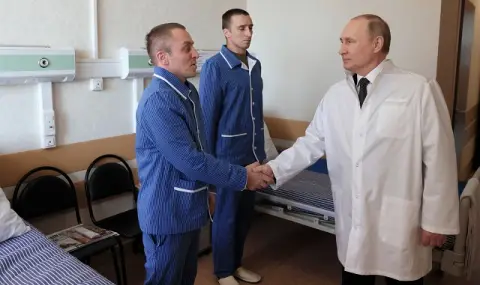At least 110,000 Russian soldiers have been injured so far in the war against Ukraine. More than half of them have at least one limb amputated. War invalids feel abandoned by the state and society.
Russia does not provide official information on the number of soldiers killed and wounded on the fronts in Ukraine. In October 2023, Deputy Minister of Labor and Social Policy Alexei Vovchenko said that 54% of seriously injured Russian soldiers had to have a limb amputated. At the end of 2024 Deputy Defense Minister Anna Tsivilova, who independent Russian media say is a relative of President Vladimir Putin, said the total number of permanently disabled veterans was 110,000.
The wounded are being sent back to the front
Earlier this year, several videos purporting to show Russian military commanders sending wounded soldiers back to the front were shared on the Russian social network VKontakte. In another video, a military policeman threatens two men in camouflage clothing with sexual assault. Authorities confirmed the authenticity of the video and said the perpetrator had been arrested. The soldiers in the video turned out to be contract soldiers who complained when their commanders tried to send them back to the front. Tsivilova confirmed this in an official statement, explaining that 96% of wounded soldiers will return to the front "thanks to modern field hospitals." This suggests that the Russian army may be struggling with resources.
"I assume that about six out of every ten wounded soldiers have serious injuries", a veteran told DW, speaking on condition of anonymity. He was recently discharged due to his own injuries, which he declined to disclose for security reasons. "The main thing is that my arms and legs are intact", he said, adding that he is currently waiting for a one-time payment of several million rubles. He says his disability pension of 22,000 rubles (equivalent to about 220 euros) is low. "I became disabled at the age of 36 and lost my health, but what can I do? "I served my country and I have no regrets," he added. He suspects that the army may be sending wounded soldiers to the front to punish them for drug crimes or faking injuries.
Discontent over low compensation
Recently, much of the online discontent has been directed at the latest presidential decree, which reduced one-time compensation for minor injuries from 3 million to 1 million rubles. Compensation for other, even minor, injuries can no longer exceed 100,000 rubles. Complaints have surfaced on VKontakte that doctors are downplaying injuries. A soldier named Oleg wrote that doctors initially classified his injury as moderate. "The day they discharged me, it suddenly turned out that my injury was minor. "They said there were new lists and categories now," he says.
Former mercenaries from the private military company "Wagner" - one of the most brutal units that fought on Russia's side - also complain that the Russian state does not recognize them as participants in the war against Ukraine. One of them, named Pavel, wrote on VKontakte that he can no longer walk because of his wounds and is "left to his fate." He said he receives a disability pension from the state in the amount of about 10,000 rubles, but he has been denied compensation.
Some users complain about the high cost of prostheses. A woman from Perm says that her brother, who participated in the war, cannot afford the 5 million rubles needed for a high-quality prosthesis. She explains that social benefits cover only a small part of the costs. Several regions have reported shortages of certain prosthetics due to international sanctions against the Russian Federation, which has led to rising prices and longer waiting times.
Difficult integration back into society
Historian Aglaya Asheshova, who works at the University Library of Languages and Civilizations in Paris, France, told DW that one of the main problems Russia will face after the war is the reintegration of war invalids into society. The expert on post-war societies explained that in most countries, people who became disabled as a result of the war are largely isolated from mainstream society. She suggested that in the case of Russia, the authorities may transfer care for war invalids to the regions, which will make it even harder for them due to limited resources.
Former Russian military man Nikita Tretyakov writes on his Telegram channel that disabled veterans often face unemployment because few people want to hire them. He describes the case of a former soldier who was seriously injured and was denied a job as a sales consultant. In an interview, he was told that there were concerns about his mental state, as he had participated in the war in Ukraine.
According to sociologist Anna Kuleshova, there are big differences in attitudes towards veterans in Russian society. This is partly due to the political polarization of the population, she tells DW. "Disabled war veterans are not perceived by everyone as heroes, and are also viewed with suspicion because people are aware from the news, as well as from personal experience, that there are cases in which military personnel use violence against civilians."
A psychiatrist who continues to practice in Russia and therefore wishes to remain anonymous, told DW that despite their injuries, most of those who participated in the war are convinced that it was justified. According to him, this is a defense mechanism for protecting the psyche that can be observed in veterans of all wars.
